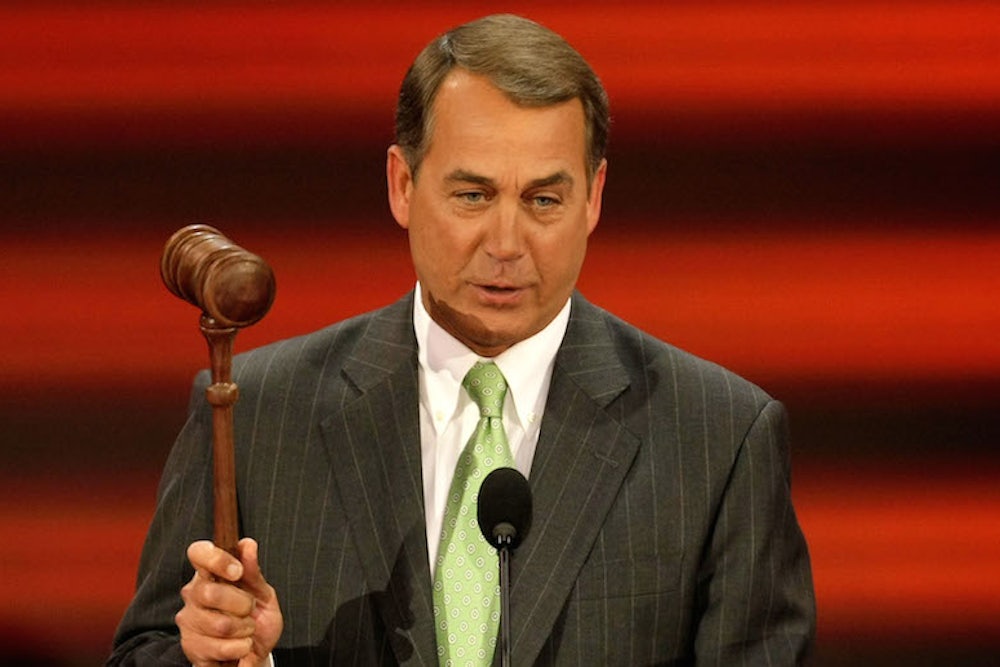The House Republican leadership elections are today, and GOPers will almost certainly reselect John Boehner, their eternally tan, chain-smoking, long-suffering caporegime, as their leader–and not only that, but they'll also probably approve Boehner's entire hand-picked roster of candidates for the caucus's other leadership positions.
On the face of it, this seems nothing short of crazy. In 1998, Newt Gingrich lost the GOP less than ten House seats and was promptly defenestrated. Boehner has not only presided over the loss of more than fifty seats for the party, but he also suffered a humiliating defection by rank-and-file conservatives on September's bailout bill–a mutiny that I was certain, then, presaged a bigger challenge to his rule by young right-wingers after the election.
But no, House GOPers are taking Boehner back: It's as though the captain of the Titanic survived and got tapped to run another transatlantic cruise. Or as Representative Mike Burgess, a Texan running for policy committee chair who objects to approving Boehner's whole leadership-candidate roster, put it to me on the phone: "If we stamp [Boehner's roster] and walk out of the room in fifteen minutes, our supporters, conservatives across the country, will think, ‘Well, these guys clearly have not suffered enough.'"
The conventional explanation for Boehner's invincibility is that his right-wing opponents are too green and that the GOP is too weary and wounded to mount a coup. But this doesn't give Boehner enough credit. Obama the grassroots-empowerer and Rahm Emanuel the coalition-builder have been getting all the credit for political genius these days, but as far as cementing one's hold on power goes, Boehner is the most brilliant man in Washington. Who in this town is living "Team of Rivals"? Forget Obama–it's Boehner. One by one, he masterfully co-opted or defused his rivals in the conservative faction. Rising star Eric Cantor, the guy who could have most easily toppled Boehner this year, was given the number-two job of whip, currently held by Roy Blunt, who's graciously giving way to Cantor. ("Blunt fell on his sword for Boehner," says one GOP aide.) Right-wing power broker Mike Pence, who ran against Boehner for leader in 2006, was gently lured into the fold when Boehner let him take the lead on the House GOP's big August pro-drilling push and then effusively praised him for it. ("I'm starting to understand why [the House GOP conference] went with John Boehner," Pence gushed in return after the episode.)
And then, using the newly loyal Pence, Boehner outmaneuvered one more potential enemy, conservative upstart Jeb Hensarling of Texas. After the November 4 bloodbath, Boehner called Pence and asked him to run for conference chair, a leadership role that one of Boehner's allies had suddenly and mysteriously vacated–the very post Hensarling had been planning to run for. Pence and Hensarling have the same power base, and with Pence in the ring, Hensarling had to give up his bid. Checkmate!
But put aside the skillful way he handles his generals. Why do the rank-and-file troops stick with Boehner? Well, he's personally nice; he makes a big show of letting members have their say at meetings ("which makes it harder for people to walk out and grumble, ‘Boehner made a mistake,'" notes a former GOP leadership aide); and–most crucially–he's learned the core political art of appearing to be everything to everybody.
Take the bailout-bill vote. Although Boehner technically backed the first, failed bailout bill, he artfully managed to appear to both support and oppose it at the same time. Boehner coined an instant anti-bailout rallying cry when he derided the bill as a "crap sandwich"; then, hours later, he minted himself a pro-bailout hero by hamming it up for the bill on the House floor, weeping and pleading, "What's in the best interest of our country? Vote yes!" The Oscar-worthy performance left both moderates and right-wingers impressed. Pro-bailout pundit Norm Ornstein placed Boehner in the pantheon of politicians who "transcended the partisan divide ... because they believed the country needed it," while anti-bailout agitator Newt Gingrich marveled on cable TV that Boehner had enabled conservative opposition, telegraphing the message that "‘we can't go along with it, the House Republicans.'" Shrugs an anti-Boehner GOP aide: "The leader pivoted in the exact right way, at the exact right time ... the bailout stuff just didn't stick to him"
In a political moment when Republicans are bitterly split between the vanishing moderates, who believe that embracing their centrism is the only way to save the party, and the ascendant conservatives, who are itching to repurify the party along right-wing principles, Boehner maintains power–for now–by dancing between the two poles. "Boehner stays because he's acceptable to both sides–the hard-core [conservatives] and the non-hard-cores," explains another Republican staffer. It's a pivot even Rahm, a former male ballerina, could envy.
